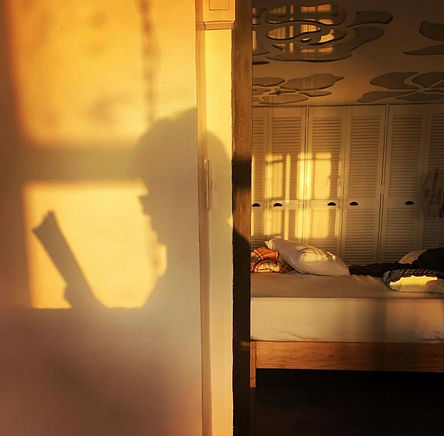
ABSTRACT
When the COVID-19 pandemic halted the world in March 2020, it exacerbated the ‘falling away’ of strongholds and support systems in society and revealed the precarious conditions entrenched in capital accumulation. Attributed to the creative desire for innovation in finding new ways to make sense of our world, creating new connections, and carving a space for the performative body to ‘appear’ and ‘occupy’ amidst isolation and distancing, artists and creatives have been among the first to respond to the vulnerabilities that the pandemic exposed and amplified in our lives.
The present work emerges from this unique context of disruption and production.
This PhD consists of two components: First, a creative project presented here with an audio-visual documentation, entitled Adow ne Domaget 2020 KKK: Kuwento, Kultura, at Kalusugan sa Katutubong Komunidad. This was a radio program made in collaboration with the Dumagat Indigenous Peoples community in Dingalan, Aurora, Philippines, and the Aurora Artist Residency Program and Space (AARPS) Collective, and it was broadcasted from April to June 2020 on the community radio station Radyo Kaedup in Dingalan and the Adow ne Domaget and AARPS YouTube Channels. The second component is a reflexive and experiential exegesis that provides a detailed account of the concept, creation, and analysis of the creative and curatorial process.
The production of the radio program amidst the COVID-19 pandemic involved making critical ethical decisions concerning collaborative community-based work that was conducted remotely and asynchronously. This incited deep reflections on the concepts of voice, relationships, and gathering in creative practices that are anchored on community engagement and collective making. From these ruminations, I ask the following questions: how might we reconsider an ‘ethics of practice’ in creative engagements centred on community work? How can ‘ethical response’ be shaped in creative
pursuits that are constantly evolving, continuous, and enduring? How can an ‘ethics of relations’ be understood in creative pursuits that are grounded in collaborative and collective work? And how can stories, story construction or storying, and storytelling aid in elucidating, materialising, and demonstrating this reconsidered ethics of practice?
Presented as practice-led research, this PhD work utilises three modes of critical reflection to explore the research questions at hand: critical storying, critical conversations, and critical storytelling. Critical storying centres on tracing the author’s personal experiences and previous creative works that informed the making of both the radio program and this exegetical writing. Critical conversation incorporates the voice of the AARPS Collective in analysing the process, ethical considerations, and community implications of making the radio program. Finally, critical storytelling focuses on the modes of narration, particularly experimental storytelling, in presenting the complex ethical considerations and responses that arise in collaborative and collective making settings, especially in times of crises.
Using the aforementioned method, this work explores an onto-epistemology of ethical engagement and relations that is based on fluidity, care, response-ability, and responsibility, in creative practices involving collaborative making with communities and collectives.

The researcher's silhouette at daybreak, taken in August 2023, while reading and writing this exegesis
The proposals presented in this work are deemed to have significant implications for the advancement of knowledge and practice in the fields of community arts, cultural work, and community engagement, as well as for the broader discourse on ethics.
Prologue: Notes on Meandering and Eavesdropping
This Prologue provides notes on reading and meandering through the exegesis. Functioning more like curatorial notes rather than being part of the Introduction, this short chapter expounds on the multiple voices at play in the PhD work, the non-linear but fluid narrative of the PhD, the dialectical relationship between absence and presence, and the partiality of connections in any given moment of engagement, to include, the ‘reading’ of this exegesis. Importantly, it addresses the reader of this exegesis as an overhearer that focuses on the sonic agency in hearing from the outside or as one passes by in this performance of reading-meandering.
An introductory video with the voice of the researcher, hinting at the place where she's working from, the people she's working with, and the socio-political context that she is constantly working through. Telling of the exegetical writing that the readers are about to read, and hopefully, experience.
A foreshadowing of a journey in a state of incessant motion.
The researcher, Roselle Pineda, is also the Founder and Creative Director of Aurora Artist Residency Program and Space (AARPS). In this video, she discusses the AARPS' mission, vision, and projects, and how the collective adapted and thrived through creative thinking and action, to build connections and bring communities together during the challenging times of the COVID-19 pandemic.
This video was originally created for "Tuloy Po Kayo," the biggest online multi-arts open community festival held in 2021, organized by the Cultural Center of the Philippines and featuring artists from the various art disciplines. It was published in CCP's Facebook site on March 2021 at https://fb.watch/4lk7t6yQSJ/.


